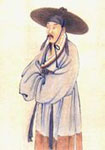山川荒绝风俗异
墨翻初若鬼神怒,字瘦忽作蛟螭僵;宝刀出匣挥雪刃,大舸破浪驰风樯。
纸穷掷笔霹雳响,妇女惊走儿童藏。
往时草檄喻西域,飒飒声动中书堂。
一收朝迹忽十载,西掠三巴穷夜郎。
山川荒绝风俗异,赖有酒美犹能狂,醉中自脱头上帻,绿发未许侵微霜。
人生得丧良细事,孰谓老大多悲伤!
山川荒绝风俗异。宋代。陆游。朱楼矫首隘八荒,绿酒一举累百觞,洗我堆阜峥嵘之胸次,写为淋漓放纵之词章。墨翻初若鬼神怒,字瘦忽作蛟螭僵;宝刀出匣挥雪刃,大舸破浪驰风樯。纸穷掷笔霹雳响,妇女惊走儿童藏。往时草檄喻西域,飒飒声动中书堂。一收朝迹忽十载,西掠三巴穷夜郎。山川荒绝风俗异,赖有酒美犹能狂,醉中自脱头上帻,绿发未许侵微霜。人生得丧良细事,孰谓老大多悲伤!
堆阜峥嵘:(形)形容高峻,也比喻突出、不平凡:山势~|殿宇~。
胸次:胸间。亦指胸怀。
淋漓:(形)①湿淋淋地往下滴:大汗~|墨迹~|鲜血~。②非常畅快:痛快~。
放纵:(动)放任纵容,没有约束。[近]放任|纵容。[反]节制。②(形)没有礼貌;不守规矩。[近]放荡。
鬼神:鬼与神的合称。泛指神灵、精气。偏指鬼;死去的祖先。指形体与精灵。古代指天地间一种精气的聚散变化。
宝刀:宝刀bǎodāo稀有珍贵的刀手持宝刀。——《广东军务记》宝刀锋从砥砺出,梅花香自苦寒来。
破浪:破浪pòlàng船顶着风浪一往直前挪威人的船用高大的船首在海峡中破浪前进。
霹雳:一种强烈的雷电现象,发生于云层与地面之间,引发巨大的响声,危害人畜、建筑物等。现多形容突然发生的、带给人巨大打击的事件。
妇女:(名)成年女子的通称:~工作|~联合会|保护~儿童。
儿童:(名)年纪比少年小的未成年人。
《醉後草书歌诗戏作》是宋代陆游创作的一首诗词。以下是这首诗词的中文译文、诗意和赏析:
朱楼矫首隘八荒,
红楼高耸,俯瞰八方荒凉,
Translation: The vermilion tower stands tall, overlooking the desolation of all directions.
绿酒一举累百觞,
绿色的酒一举杯,已经喝了百杯,
Translation: With a single toast of green wine, a hundred cups have been consumed.
洗我堆阜峥嵘之胸次,
洗涤我那高耸峻峭的胸怀,
Translation: Cleansing my lofty and resolute spirit,
写为淋漓放纵之词章。
写成了奔放自如的诗章。
Translation: Composing a poem that is unrestrained and vivid.
墨翻初若鬼神怒,
墨水翻涌,仿佛鬼神的怒火,
Translation: The ink surges, as if the anger of ghosts and gods,
字瘦忽作蛟螭僵;
字迹瘦弱,突然变成了僵硬的蛟螭;
Translation: The characters become thin and rigid like a dragon.
宝刀出匣挥雪刃,
宝剑从剑鞘中抽出,挥舞着雪亮的刀锋,
Translation: The precious sword is unsheathed, wielding a gleaming blade,
大舸破浪驰风樯。
巨船破浪前行,迎风扬帆。
Translation: The large ship breaks through the waves, sailing with the wind.
纸穷掷笔霹雳响,
纸张用尽,扔下笔,发出霹雳般的声响,
Translation: The paper is exhausted, the pen is thrown, making a thunderous sound,
妇女惊走儿童藏。
妇女们惊慌逃跑,孩子们躲藏起来。
Translation: Women are startled and flee, while children hide.
往时草檄喻西域,
过去的时光,用草书传递消息,比喻西域,
Translation: In the past, grass-script proclamations conveyed messages, metaphorically referring to the Western Regions,
飒飒声动中书堂。
飒飒的声音在中书堂中回荡。
Translation: The sound echoes in the study hall.
一收朝迹忽十载,
一收拾朝廷的痕迹,转眼已过去十年,
Translation: Gathering the traces of the court, ten years have passed in the blink of an eye,
西掠三巴穷夜郎。
向西征服三巴,到达贫瘠的夜郎,
Translation: Conquering the Three Gorges in the west, reaching the desolate land of Yelang.
山川荒绝风俗异,
山川荒凉,风俗奇异,
Translation: The mountains and rivers are desolate, the customs are peculiar,
赖有酒美犹能狂,
幸好有美酒,依然能够狂放不羁,
Translation: Fortunately, with fine wine, one can still be wild and unrestrained,
醉中自脱头上帻,
醉酒之中,自己脱下头上的帽子,
Translation: In drunkenness, removing the hat from one's head,
绿发未许侵微霜。
青春未允许白发侵袭。
Translation: Youth is not yet allowed to be invaded by gray hair.
人生得丧良细事,
人生中失去的是些微小的事情,
Translation: In life, what is lost are trivial matters,
孰谓老大多悲伤!
谁说老去只有悲伤!
Translation: Who says that old age is only filled with sorrow!
这首诗词以豪放的笔触描绘了作者醉后的情景和心境。作者借酒释放内心的狂放和豪情,表达了对世事变迁的感慨和对人生的思考。诗中运用了丰富的意象和比喻,展现了作者的才情和豪情壮志。整首诗词以自由奔放的语言和形象,表达了作者对人生的积极态度和对自由的追求。
陆游
陆游(1125—1210),字务观,号放翁。汉族,越州山阴(今浙江绍兴)人,南宋著名诗人。少时受家庭爱国思想熏陶,高宗时应礼部试,为秦桧所黜。孝宗时赐进士出身。中年入蜀,投身军旅生活,官至宝章阁待制。晚年退居家乡。创作诗歌今存九千多首,内容极为丰富。著有《剑南诗稿》、《渭南文集》、《南唐书》、《老学庵笔记》等。...
陆游。陆游(1125—1210),字务观,号放翁。汉族,越州山阴(今浙江绍兴)人,南宋著名诗人。少时受家庭爱国思想熏陶,高宗时应礼部试,为秦桧所黜。孝宗时赐进士出身。中年入蜀,投身军旅生活,官至宝章阁待制。晚年退居家乡。创作诗歌今存九千多首,内容极为丰富。著有《剑南诗稿》、《渭南文集》、《南唐书》、《老学庵笔记》等。
